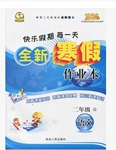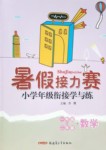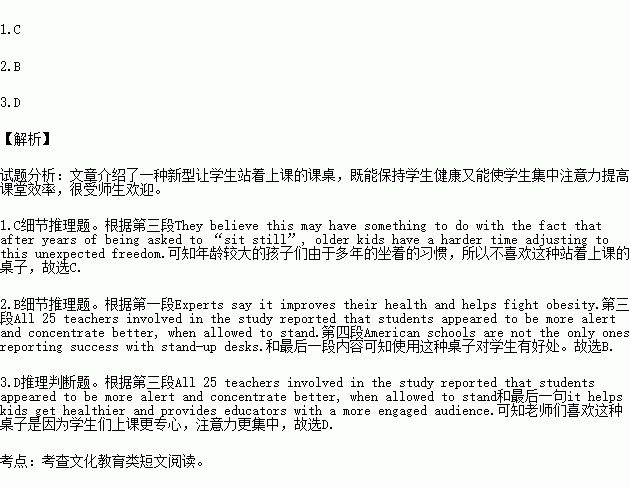题目内容
Love to sink into your chairs and relax when you get to school? Then you will not be happy to hear that schools all over the world are seriously considering exchanging traditional desks for ones with no seats at all — Yes, that means you will be encouraged to stand through those already too long math and science lessons! Why would anyone even think of putting kids to such cruelty? Experts say it improves their health and helps fight obesity. While that may seem a little far-fetched (牵强的), the officials at the few schools around the world seem to agree.
Among them are educators from the College Station Independent School District in Texas, who recently completed a week-long experiment involving 480 students across three elementary schools. The 374 kids that agreed to participate in the study were provided with a device that helped record step count and calorie consumption over the entire period.
All 25 teachers involved in the study reported that students appeared to be more alert and concentrate better, when allowed to stand. The one thing that did surprise the researchers was that younger kids were more willing to stay standing than kids in higher grades. They believe this may have something to do with the fact that after years of being asked to “sit still”, older kids have a harder time adjusting to this unexpected freedom.
American schools are not the only ones reporting success with stand-up desks. Four Catholic schools in Perth, Australia, which have been testing them since October 2013, have seen similar results. In May 2014, Grove House Primary School in Bradford, West Yorkshire, became Europe’s first test one, with a seven-week trial that involved the use of desks made by Ergotron in their fifth-grade classrooms. While official results are not out yet, early reactions from both teachers and students, have been extremely encouraging.
The findings of these studies and others done previously, all seem to mean that allowing kids to move around in classrooms is a win-win for students and teachers — it helps kids get healthier and provides educators with a more engaged audience.
1.According to the teachers, older students may not like stand-up desks because ____________.
A. they are cleverer than younger students
B. they are easily tired of standing long
C. they have formed the habit of sitting
D. they do badly in class while standing
2.What is most likely to be the result of the seven-week trial?
A. The standing desks can’t be used at all.
B. It is good for students to use stand-up desks.
C. More tests should be done in other schools.
D. The students are different in personality.
3.Why do the teachers like the standing desks?
A. Because the educators can draw the students’ attention.
B. Because the teachers can keep the students healthy.
C. Because the students can have a walk in the classroom..
D. Because the standing desks can keep the students concentrated.
 桃李文化快乐暑假武汉出版社系列答案
桃李文化快乐暑假武汉出版社系列答案 优秀生快乐假期每一天全新寒假作业本系列答案
优秀生快乐假期每一天全新寒假作业本系列答案 暑假接力赛新疆青少年出版社系列答案
暑假接力赛新疆青少年出版社系列答案
